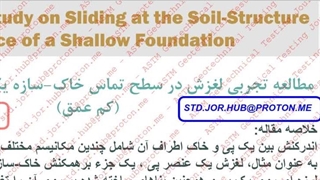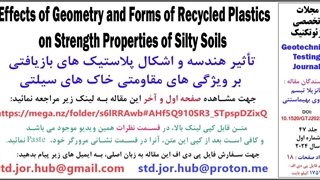
ASTM - GEOTECHNICAL TESTING JOURNAL
Effects of Geometry and Forms of Recycled Plastics on Strength Properties of Silty Soils - GTJ20220261
Although significant efforts are being made to evaluate the use of recycled materials in the construction industry, the effects of their shapes and sizes on the mechanical behavior of plastic-treated materials remained unclear. This paper presents results and analysis of recycled
high-density polyethylene (HDPE) plastics with variations in their shapes, sizes, dosage content (1 %, 2 %, 4 %, 8 %, and 12 % by dry weight soil), and cement content (9 %, 12 %, and 15 % by dry weight of soil) to enhance the strength-deformation characteristics of high-plastic silts. A series of experimental studies were performed to evaluate the unconfined compressive strength, stress–strain behavior, energy absorption capacity, and strength retention of the soils treated with recycled HDPE flakes and long pellets. Test results showed that the inclusion of 4 % regrind flakes plastics with 9 % cement content increased the soil strength up to 193 % more than the control soil. Results also showed that the ductility index of the samples with 15 % cement increased from 6 to 7.5 as the regrind flakes content were increased from 4 % to 12 %. The optimal dosage content of recycled plastics and cement content is presented based on the compressive strength, energy absorption capacity, percent strength retention, soil loss, and volumetric strains of the treated soils. This research highlights the
importance of the geometry of the recycled plastics and their influence on strength-deformation characteristics with application to pavement subgrade soil stabilization.

نظرات (۲)